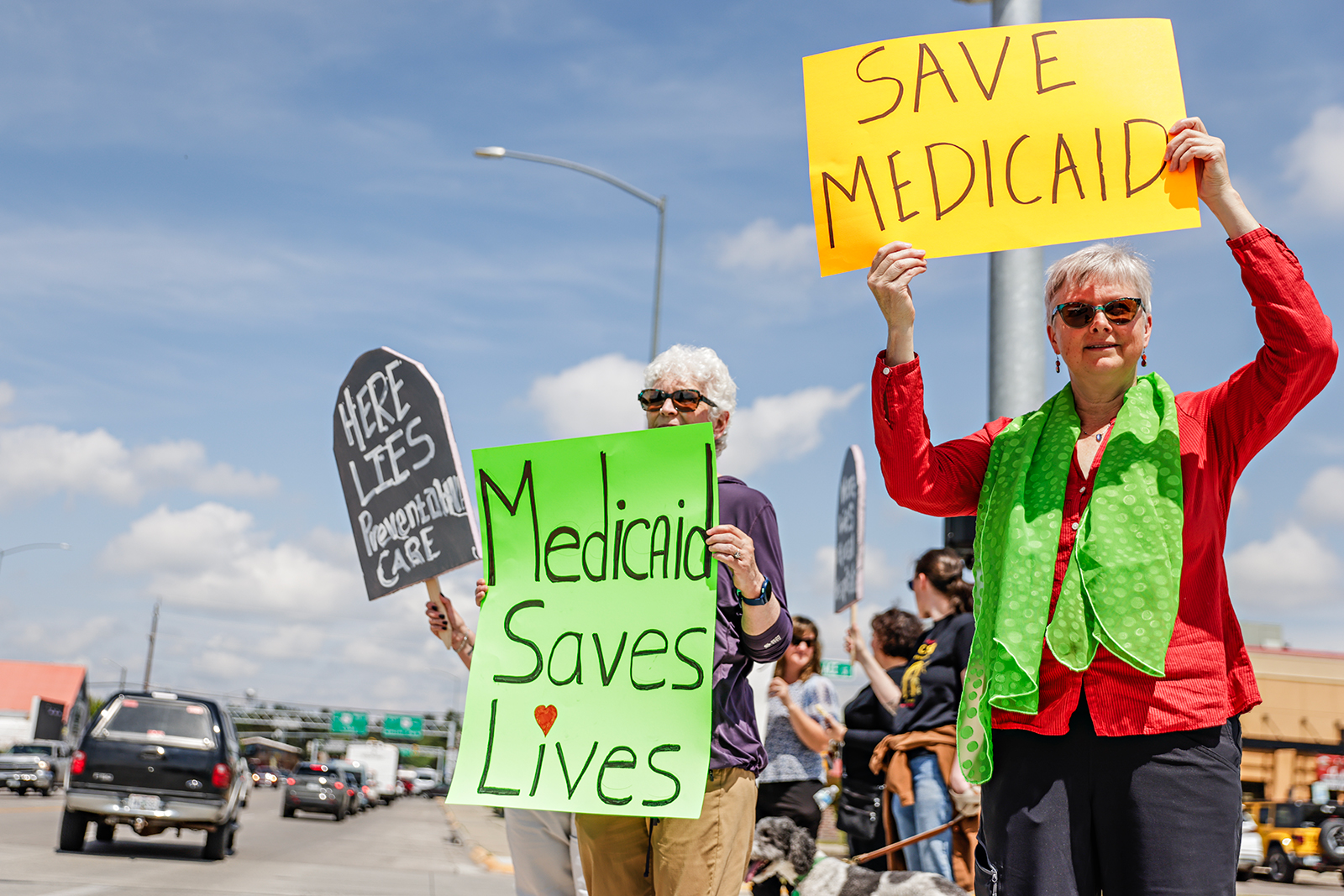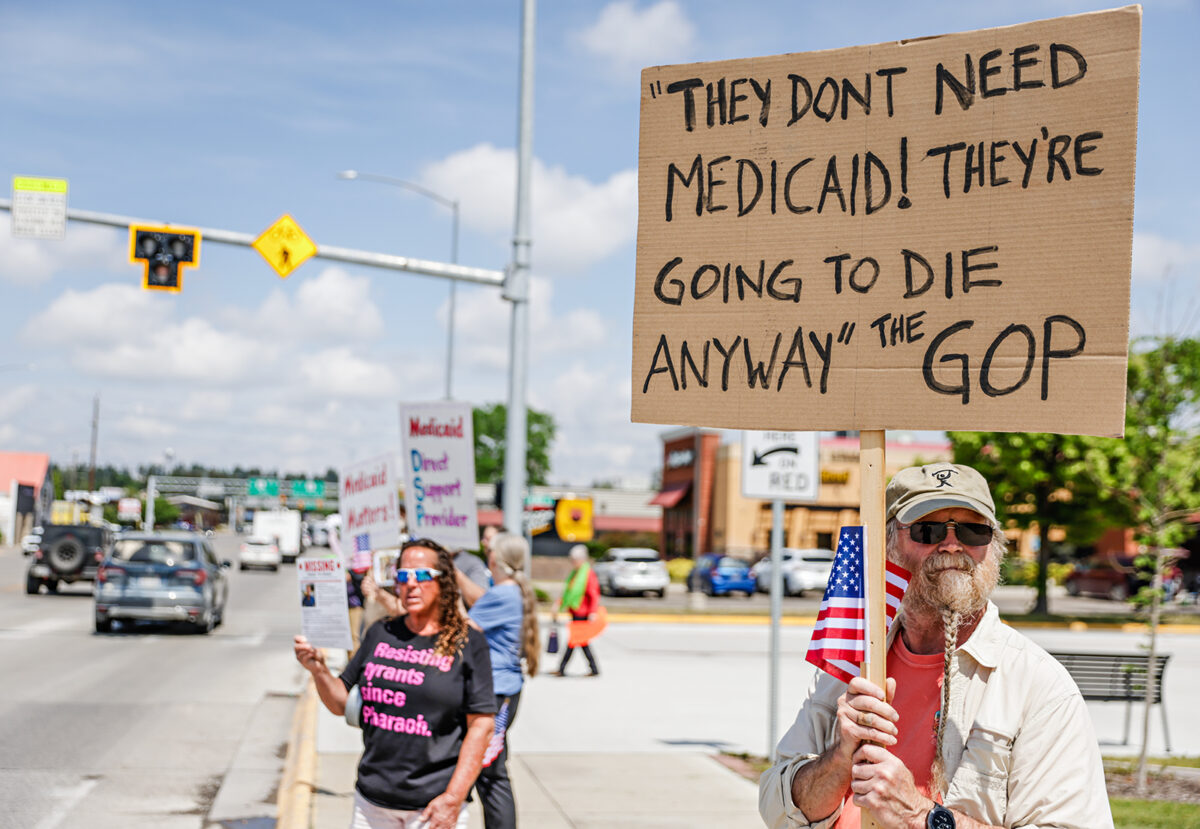Locals Rally Against Medicaid Cuts in ‘Big Beautiful Bill’
Rally-goers protested Montana U.S. House Rep. Ryan Zinke's support of the legislation
By Mariah Thomas
Franteesa Palmatier credits Medicaid as the reason she gets to live a life she loves.
The local business owner has spent a lifetime on and off of Medicaid, a government program that provides health insurance for adults and children with limited income.
She shared she was born into poverty and rarely visited a doctor as a child. When she did, it was thanks to Medicaid.
As an adult, Palmatier said she experienced domestic abuse, struggled with addiction and became homeless as a result. But she reached out to the Abbie Shelter, received treatment and has been clean since 2021.
Now, she owns a tattoo studio — Permanence — in downtown Kalispell, and has a 1-year-old daughter.
“I get to give her a safe beginning, not by chance, but because I fought to break the cycle, because I had access to care when I needed it the most,” Palmatier said. “That’s what programs like Medicaid make possible. They give people the key to a better future.”
Palmatier told her story to a crowd of about 20 people at a rally at Depot Park Thursday afternoon. The rally was held to protest against U.S. Rep. Ryan Zinke’s vote on the budget reconciliation bill.

Better known as the “One Big Beautiful Bill Act,” the budget reconciliation bill is a sweeping piece of legislation, part of which aims to reduce or increase spending for several federal programs. Federal programs affected, should the bill pass, include Medicaid.
Federal Medicaid spending would decrease by more than $700 billion over the next decade, according to Congressional Budget Office estimates. Millions of people would also lose medical insurance coverage.
Lawmakers have argued work requirements for Medicaid included in the bill would save billions of dollars in waste and fraud. Childless adults without disabilities would have to work 80 hours per month to qualify for benefits, according to the bill’s current version.
The legislation passed the U.S. House of Representatives in a 215-214 vote on May 22. Zinke voted in favor, as did Montana’s second U.S. Rep. Troy Downing, who represents the eastern half of the state.
“Today I voted to end tax on tips for Montana service workers, lower taxes on Social Security for Montana seniors, and deliver tax relief for ALL Montanans; all while making investments in our national security and safeguarding our public lands,” read a press release from Zinke about his vote on the bill.
“The Big Beautiful Bill is the bold, decisive action Montanans and Americans demanded. No more taxpayer giveaways to illegal immigrants. Just a return to putting America first,” the statement continued. “The Big Beautiful Bill delivers permanent tax relief with no tax on tips or overtime, lower taxes on Social Security, protections for entitlements from fraud, and doesn’t sell out our public lands. For Montanans, that means more freedom, more security, and more money in your pocket, while protecting the things that matter most.”
At the state level, Montana’s legislature voted to extend Montana’s Medicaid expansion program during this year’s legislative session.
The state’s program was originally slated to sunset in 2025. Medicaid expansion covers insurance costs for over 75,000 Montanans, according to March figures from the Department of Public Health and Human Services. That includes over 7,000 people in Flathead County. Federal dollars cover 90% of the cost of Montana’s Medicaid expansion.

The crowd Thursday carried tombstones bearing messages: “R.I.P. Medicaid,” “Here Lies Rural Hospitals” and “R.I.P. Zinke’s spine.”
Palmatier was joined by two other speakers. Kim Paulson, a nurse in Kalispell and member of the Service Employees International Union, and Leanette Galaz, an organizer with Flathead Democracy also spoke. All three speakers railed against the idea of cutting Medicaid.
Paulson said, in her personal experience as a nurse, she has seen overcrowded emergency rooms, children struggling with mental illness, rural hospitals struggling to keep their doors open and people delaying care due to affordability.
“Medicaid often provides essential access to counselors, therapists and specialized treatments that many families simply cannot afford otherwise,” Paulson said.
After the speeches, rally attendees marched down Main Street, carrying a petition to protect Medicaid to the doors of U.S. Sen. Tim Sheehy’s office.
The budget bill now lies in the Senate’s hands. It’s uncertain when the Senate plans to vote on the bill.